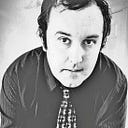Member-only story
“Create your own style.” — Meet Piotr Szkopiak, writer/director of the WWII, based on a true story thriller The Last Witness

I caught up with director Piotr Szkopiak, for an interview on the importance of creating your own style, film-making, the cycles of history, world affairs, the art of the thriller, and telling a story that is very close to his heart in his latest, a based on a true story murder mystery surrounding some very real, very bloody, and very covered up events around WWII and the Allies, called The Last Witness, out today on VOD and Digital HD.
A recent study by the Claims Conference (highlighted in the New York Times) and released on Holocaust Remembrance Day found some very disturbing trends in Americans knowledge of and empathy toward the Holocaust and the Second World War. Just a sampling of this study indicates that 52% of all Americans believe Hitler came to power through the use of force (he did not) and that 70% of Americans say “fewer people seem to care about the Holocaust then they used to” while 58% say that it could happen again.
This is truly disturbing for the further reason that the victims of the Holocaust and Hitler’s Final Solution were not the only people effected by war crimes during the Second World War, yet they were arguably the most visible and indeed their story should never be forgotten. But what of those victims of atrocities surrounding the War whose stories have never really been told at all?
Szkopiak tackles exactly that in The Last Witness, a movie he wrote with Paul Szambowski. In the film, “an ambitious young journalist (Alex Pettyfer) uncovers the horrific slaughter of 22,000 Polish officers during the Second World War. A secret that has been kept hidden for far too many years.” The film also stars Michael Gambon and Talulah Riley.
That horrific slaughter of 22,000 Polish officers was known as the Katyn Massacre (the CIA calls it “Stalin’s Killing Field” in the article linked here) and was perpetrated by the Soviet Union after the Soviet Invasion of Poland from the East in September 1939. Szkopiak’s grandfather, Wojciech Stanislaw Wojcik, was one of the officers executed at Katyn, and his mother, Emilia Szkopiak, was one of the 1–2 million Polish nationals deported into the depths of Russia. They faced forced…
